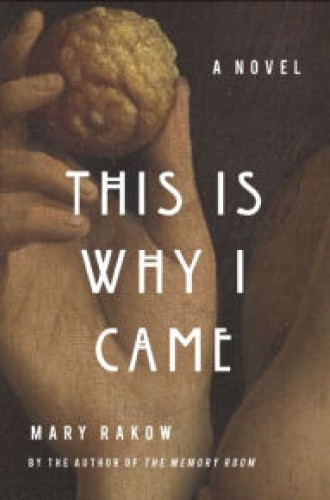Novel exegesis
A woman comes for confession, her first in 30 years. Anxiously she fingers a hand-stitched notebook filled with her own version of Bible stories, driven by her reimaginings of biblical characters. We never learn exactly why she has written these fragments, although themes emerge—uneasy family relationships, physical disabilities, mental illness. Perhaps the woman’s own story shapes them. The stories are told slant, very slant, so the reader feels their gravity. But they truly engage the scriptures. They are luminous, numinous.
Her name is Bernadette. Like the visionary saint who saw the biblical Mary in Lourdes, France, in 1858, this Bernadette too is something of a cipher as she provides a link to the sacred. She does needlework like her namesake, shares the same infirmities, and wonders if she’s going mad. She herself may be a saint—barely.
Read our latest issue or browse back issues.
Mary Rakow’s novel is just barely a novel. But in 62 brief chapters she manages to make familiar characters strange and fresh. They migrate from the Old Testament to the New, from the Bible to contemporary life, with the suggestion that they themselves may be authors. The Old Testament, for example, begins with “Adam the Maker” rather than God, although God appears soon enough. Adam creates “draft after draft after draft,” resulting in animals, when what he really wants is to comprehend himself.
Similarly, minor New Testament characters are given major roles, and people around Jesus, rather than Jesus himself, dominate the narrative. The woman healed of a long-lasting hemorrhage sees far into the future, into modern medicine and theology, to which Jesus can only say, “It’s the future.” A man named Legion and another blind since birth provide Jesus with at least as much insight as he gives them.
Throughout these sacred pages, God also seems to be learning to love, despite insecurities, second thoughts, and regrets. (“Are they right? Is this who I am? Am I a God without mercy?”) After the Flood, Noah says tersely, “You came back.” And God answers, “You made me anew.”
But God’s people are also learning. Moses, exhausted from receiving an almost endless Law, realizes that God has been saying, “Come to me. I have given you infinite doors. Pick one and come to me. Enter into the fullness of my mercy.”
A lesser writer would have made this book a satire. Rakow, a theologian who studied at Harvard Divinity School and Boston College, instead has written with great love and deep faith, raising issues latent in the original text. Like Bernadette, Rakow seems to be sitting in church, hoping to find peace again.
Yet she is unafraid to confront biblical violence. She imagines the numberless victims of the Flood—“people in trees leaping to the ark, the thud of their bodies and others leaping to their deaths.” Abraham turns out to be a serial murderer of his own children, a religious zealot who spares Isaac only after Sarah tells him, “Return with Isaac or you will live alone forever.”
In this scripture, it is God who comes in for chastisement. After the terrible Flood, Noah names the colors of the rainbow, calls the last one “violet,” and tells God, “This will be your color. The color of penance and royalty.” A resentful Jonah, tired of saving people from God, decides, “I will be God’s atheist.” For her part, Bernadette thinks that to be in church is to be “in the belly of the whale.” She finds peace only when her confessor priest tells her, “To doubt the God you believe in is to serve him. . . . It’s an offering. It’s your gift.”
Not every reader will find this book easy going. Rakow’s fragmentary prose is more like poetry, and it requires an extra effort. Of course, scripture makes similar demands. The great literary critic Erich Auerbach observed that scripture is powerful in part because it is so spare. To make sense of it we have to fill in the blanks, and that means investing ourselves in it.
Another book of stories comes to mind: Sherwood Anderson’s famous collection Winesburg, Ohio, which likewise begins with an amateur writer, an old man who has created a series of tales, “The Book of the Grotesque.” Based on “a dream that was not a dream,” the old man believes that when the world was young, there was no truth except what humans had made for themselves. Anderson explains:
There was the truth of virginity and the truth of passion, the truth of wealth and of poverty, of thrift and profligacy, of carelessness and abandon. Hundreds and hundreds were the truths and they were all beautiful. And then the people came along. Each as he appeared snatched up one of the truths and some who were quite strong snatched up a dozen of them. It was the truths that made the people grotesques. The old man had quite an elaborate theory concerning the matter. It was his notion that the moment one of the people took one of the truths to himself, called it his truth, and tried to live his life by it, he became a grotesque and the truth he embraced became a falsehood.
Bernadette has also written a book of grotesques, in which doubt is both a truth and a disfiguring falsehood.
Having carried her hand-stitched notebook into the confessional, by the desperately moving final pages of this novel she breaks down in tears: “I want to believe that he loves the world. And I want to believe . . . I want to believe that he loves even me.” And like her great namesake, she is rewarded.
In 1858, church officials could scarcely believe that the biblical Mary had reappeared to Bernadette Soubirous, a modern French woman. They tried to suppress her visions. Only after thorough investigation did they come to accept that the lines between sacred history and contemporary life might be wonderfully blurred. That wonder happens again in Mary Rakow’s book. Examine it thoroughly: it’s miraculous.







